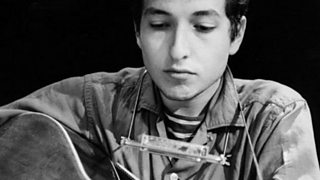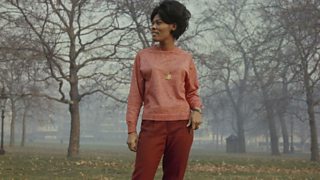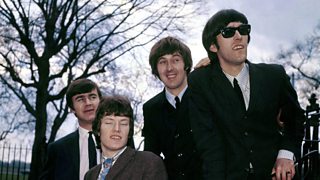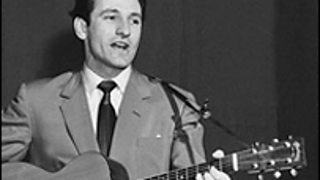Brian's Weekly Sleevenotes - 4 October 14
Little Ole Man (Uptight Everything’s Alright) - Bill Cosby

One of the earliest cases of sampling as comedian Bill Cosby takes the Stevie Wonder song 'Uptight' and relates his story of this little old man that fooled him. The track was taken from his first studio album, 'Silver Throat-Bill Cosby Sings' on which he was backed by Watts 103rd Street Rhythm Band. The single sold over a million copies in America, winning Cosby a gold disc and was released around the time Cosby hit our TV screens as Robert Cult’s sidekick in the series, 'I Spy'.
Surrender - Elvis Presley
Having been so happy with the success of 'It’s Now Or Never' adapted from 'O Sole Mio', Elvis requested his publisher to commission a new lyric for another classic Italian tune from 1902, 'Torna A Surriento' (Come Back To Sorrento) with the task being handed to songwriters Doc Pomus and Mort Shuman. Shuman was less than enthusiastic about the project and told Pomus to get on with the task on his own claiming "why should I want to write for some redneck idiot who thinks it a good career move to sound like Mario Lanza". Despite his rant, the pair ended up writing twenty-one songs for the king.
One of Us Must Know (Sooner or Later) - Bob Dylan
Taken from his seventh album, 'Blonde On Blonde' and was recorded in January 1966 for what was planned to be the closing track on side one. Arriving at the studio, he hadn’t completed the lyric or worked out the song’s title so the recording was done in fragments throughout the night and into the next morning. It wasn’t until take eighteen that a full version was recorded with the next take being selected for the album. It was the first track recorded for the album and the first to be released as a single that wasn’t a hit in America but tickled the lower end of our top forty.
Theme From Valley Of The Dolls - Dionne Warwick

The movie starred Sharon Tate, Patty Duke and Susan Hayward, based on the Jacqueline Susann novel about three young women making their way in show business. There is a brief cameo appearance by Richard Dreyfuss. The song was written by Andre and Dory Previn and had originally been intended for Judy Garland to perform before she was fired from the cast. At the suggestion of Barbara Parkins, one of the film’s stars, Dionne Warwick was invited to perform the title song with a John Williams arrangement but had to re-record it for this release as a single under the direction of Burt Bacharach because she was signed to Scepter and the soundtrack was released on 20th Century Records.
Walk With Me My Angel - Don Charles
Born Walter Scuffham in Hull, he broke into the entertainment business whilst in Hong Kong where he combined his naval duties as a diver with his bookings ashore as a singer with a local band. Changing his name to Don Bennett, he decided to try his luck back home in blighty where in 1961 he met up with George Martin who signed him to Parlophone and released the unsuccessful 'Paintbox Lover'. He was then introduced to Joe Meek who suggested Don change his name to Don Charles as Bennett was too close to Tony Bennett. He then produced a single for Decca of a song he’d originally recorded as an album track with John Leyton, 'Walk With Me My Angel' that became his only top forty hit. Meek often stated that he considered Don to have been the best voice he ever recorded.
Close Together - Jimmy Reed
Reed established himself as a competent musician by the mid fifties and although rejected by Chess Records was signed by Vee-Jay where he achieved his first in a long line of R&B hits with 'You Don’t Have To Go'. Due to health problems and his fight with alcoholism, he failed to reach the same level of success as many other artists in his field. He died in 1976 eight days before his fifty-first birthday and in 1991 was posthumously inducted into the Rock And Roll Hall Of Fame.
Keep On Running - The Spencer Davis Group

After several minor hits, the group finally broke through into the top forty with a song that had been written by one of Chris Blackwell’s reggae acts, Jackie Edwards. He had written and performed it himself with a ska beat but the Spencer Davis Group turned it into a pounding rocker and it became the first new number one in 1966. In America, the record began picking up plays on several black stations but once their picture appeared in the press and it turned out they were all white, those stations dropped the record from their playlists.
Stranger In Paradise - Matt Monro
The song comes from the 1953 musical, 'Kismet' and although credited to Robert Wright and George Forrest as composers, the melody was taken from the music of Alexander Borodin’s 'Dance Of The Maidens' from his 'Polovtsian Dances' that featured in his opera, 'Prince Egor' and it was from this work that most of the score of the musical originated. 'Stranger In Paradise' became an International hit for Tony Bennett, topping our charts in 1955 since when there have been dozens of other recordings by artists that include Engelbert Humperdinck, Johnny Mathis, Jack Jones and this 1967 version by Matt Monro that was included on his album, 'Invitation To Broadway'.
We're Through - The Hollies
This was the first ‘A’ side to be written by group members Allan Clarke, Tony Hicks and Graham Nash. When they first went into the studio to record the song that they wrote under their pseudonym of L Ransford, it had more of a bossa nova feel with a very prominent tambourine, but a week or so later, they decided to try out a slightly different arrangement that they felt was more commercial and this is the version that ended up as the hit single.
Have A Drink On Me - Lonnie Donegan

It was a well known fact that Lonnie Donegan was a huge fan of the great Huddie William Ledbetter, better known as Leadbelly and he often adapted his songs to suit his own style. One such song was 'Have A Drink On Me', that he passed on to Adam Faith who rejected it. Lonnie decided to record it himself, but included the line; 'You can make a fortune writing Adam Faith songs'.
I Can't Say Goodbye - The Fireflies
Gerry Granahan who first recorded with his group, Dicky Doo And The Don’t in 1958 also made records under his own name whilst forming The Fireflies in 1959 scoring a top forty Stateside hit that year with 'You Were Mine' after adding Ritchie Adams as lead vocalist who was given a credit on 'I Can’t Say Goodbye' the following year. Adams went on to become a successful song writer whose successes included Bobby Lewis’s 'Tossin’ And Turnin’' and 'After The Love' for Engelbert Humperdinck, both of which became million sellers.
Don't That Beat All - Adam Faith
This became Adam Faith’s thirteenth consecutive top twenty hit but the first without a John Barry arrangement with the job being handed over to Johnny Keating. However, he did retain the services of song writer, Les Vandyke for this and his next release, 'Baby Take A Bow' who had been responsible for most of his previous hits. Check out Bob Stanley's article on Adam, here.
-
![]()
Trad Jazz
Brian Matthew tells Bob Stanley about his lifelong love of Trad Jazz
-
![]()
Adam Faith
Bob Stanley celebrates the early career of the multi-talented star
















































